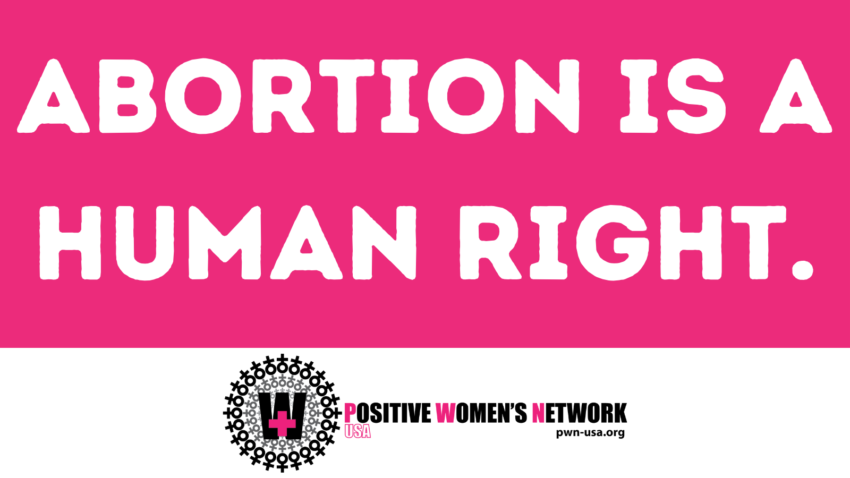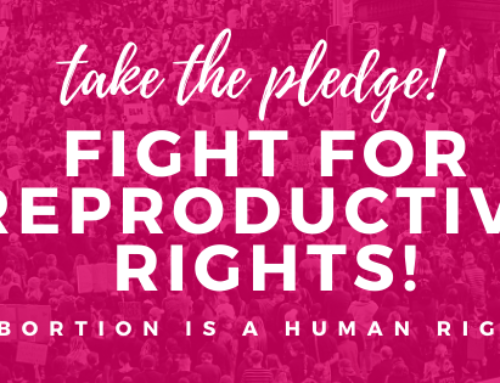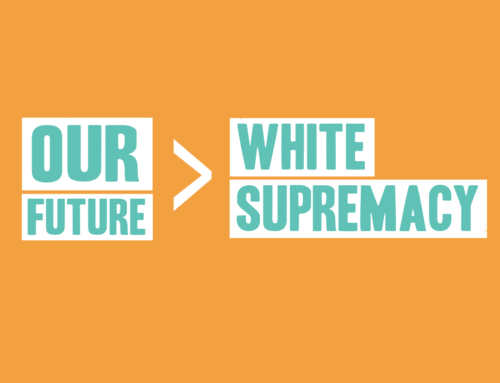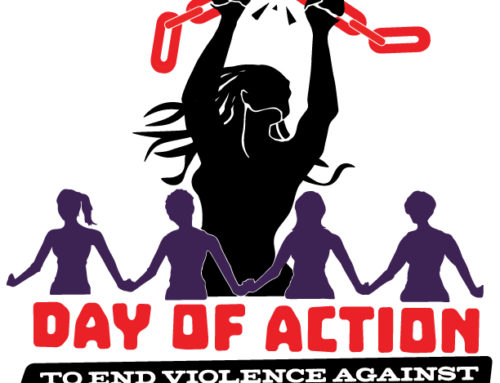
September 3, 2021: This week, the U.S. Supreme Court, which is now stacked with six reactionary justices after the Trump administration installed Neil Gorsuch, Brett Kavanaugh, and Amy Coney Barrett, effectively gutted Roe v. Wade when a five-to-four majority–including all three of Trump’s appointed justices–declined to block Texas Senate Bill 8 (SB 8) from going into effect.
Make no mistake. A lack of action is also action. This is exactly what Positive Women’s Network – USA (PWN) and other reproductive justice advocates feared, and is one of the reasons PWNers went to jail protesting the confirmation of these ideologically conservative judges.
As Justice Sonia Sotomayor said in her dissent, “The act is a breathtaking act of defiance – of the constitution, of this court’s precedents, and of the rights of women seeking abortions throughout Texas.”
Abortion care is health care, and reproductive freedom is a human right. All people deserve the right to make decisions about their own bodies, lives, and futures. This bill, which was intentionally designed to be unusually hard for courts to block, basically means that pregnant people in Texas will no longer have access to safe, legal abortion. And lawmakers and governors in several other states have already signaled they plan to pursue identical legislation. We are not confused. This is a step towards dismantling Roe v. Wade all over the nation.
But it’s not just the Supreme Court that failed us. Our elected leaders must take a strong stance in support of reproductive choice. Social justice organizations must take reproductive freedom seriously. And PWN calls on the HIV community to unapologetically step up its commitment to protect reproductive choice for all people who can get pregnant. We are furious, hurt, and disappointed that some HIV organizations and leadership have allowed abortion to be painted as an issue that is optional for HIV advocacy organizations to be silent on or to support from the shadows, in an effort not to seem “political” or “partisan.” For people who can get pregnant, especially for people of color and low-income people, legal and accessible abortions can be a literal matter of life of death.
We repeat: abortion is health care. Period.
PWN has put together a short explainer of what SB 8 is and does, why it’s so dangerous, and how it’s different from other abortion restrictions below.
What Happened:
- Texas Senate Bill 8 (SB 8), a bill restricting abortion, went into place in Texas following the denial of the Fifth Circuit Court of Appeals to block the bill then the denial of an emergency request to the U.S. Supreme Court from a group of reproductive rights (and other) organizations–including the ACLU, the Center for Reproductive Rights, and Planned Parenthood, among others–to block it.
- The U.S. Supreme Court denied the emergency request to block SB 8, and it took effect as of September 1, 2021.
What SB 8 Does:
- SB 8, deceptively called by its supporters the “Texas Heartbeat Act” or “Heartbeat Bill,” is a law introduced in Texas that was signed into law by Texas’ Governor Gregg Abott, in May of 2021.
- The law bans abortion care at six weeks, or when a “fetal heartbeat” is detected. (The term “fetal heartbeat” is misleading–at six weeks, the heart is not actually developed yet, and what the ultrasound detects is just electrical activity generated by cells grouping together.)
- The law creates a “bounty-hunting scheme” that encourages private individuals to sue anyone in Texas who is in violation of the law by awarding at least $10,000 to the individual – to be paid by the person who is being sued.
- People who can be sued under this bill include: abortion providers; a person who brings someone for an abortion, including ride-share drivers; health center staff; any abortion funds that assist with financial assistance to patients; clergy who assist abortion patients; and more.
Why SB 8 Is Bad News:
- Most people don’t know they are even pregnant by six weeks! Furthermore, Roe v. Wade allows for abortions up to 24 weeks–so this law is in direct violation of the established precedent of Roe v. Wade.
- This bill does not make any exceptions for people who have become pregnant as a result of rape or incest – there is only an exception for medical emergencies.
- “In less than two days, Texas politicians will have effectively overturned Roe v. Wade … Patients will have to travel out of state – in the middle of a pandemic – to receive constitutionally guaranteed healthcare. And many will not have the means to do so. It’s cruel, unconscionable, and unlawful.” – Nancy Northrup, President and CEO of the Center for Reproductive Rights
- To get an abortion, a person living in Texas will have to travel outside of the state if it is after six weeks of pregnancy.
- The average one-way driving distance for pregnant Texans seeking abortion will go from 12 miles to 248 miles.
- Added expenses such as travel expenses (transportation, hotel stays, childcare, lost work wages, etc.) will be incurred by Texans seeking abortion when they have to now travel out-of-state for their abortions.
- Many of the neighboring states have abortion restrictions in place that make it difficult for Texans to get abortions.
- Some of the people who will be most affected by this bill include people of color, young people, people struggling financially, and people who live in rural areas.
- Even if the ban is ultimately blocked, it will have the lasting effect of providing a roadmap for other states to enact similar restrictions.
- This law has already affected clinics across Texas as many have stopped scheduling visits related to abortions that would take place after six weeks, and many are losing staff who fear being sued.
How S.B. 8 Is Different From Other Abortion Restrictions:
- “Instead of allowing government officials to enforce the abortion ban as they do with most laws, this law says that private citizens can step in by suing abortion providers and anyone who ‘aids and abets’ a patient obtaining an abortion after six weeks.” (Time Magazine)
- The way the law is written makes it difficult to challenge, because the constitution only applies to government actors and not to private individuals, and the persons who are being sued here could be a host of private individuals
Key Takeaway from the Opinion:
- The decision focused on procedural issues and not the constitutionality of the law. Because it is not the government who is to be subjected to suit or filing suit based on the guidelines of this new law, there is no way for the Supreme Court to enforce the Constitution against private individuals.
Key Remarks in Dissent:
- From Justice Sonia Sotomayor:
- “The legislature took the extraordinary step of enlisting private citizens to do what the state could not.”
- “The legislature fashioned this scheme because federal constitutional challenges to state laws ordinarily are brought against state officers who are in charge of enforcing. By prohibiting state officers from enforcing the act directly and relying instead on citizen bounty hunters, the legislature sought to make it more complicated for federal courts to enjoin the act on a statewide basis.”
- “The act is a breathtaking act of defiance – of the constitution, of this court’s precedents, and of the rights of women seeking abortions throughout Texas.”








THANK YOU. This gave me a very clear explanation to share with people who haven’t been paying attention and now are trying to react. I love you all and the amazing voices you center and lift.